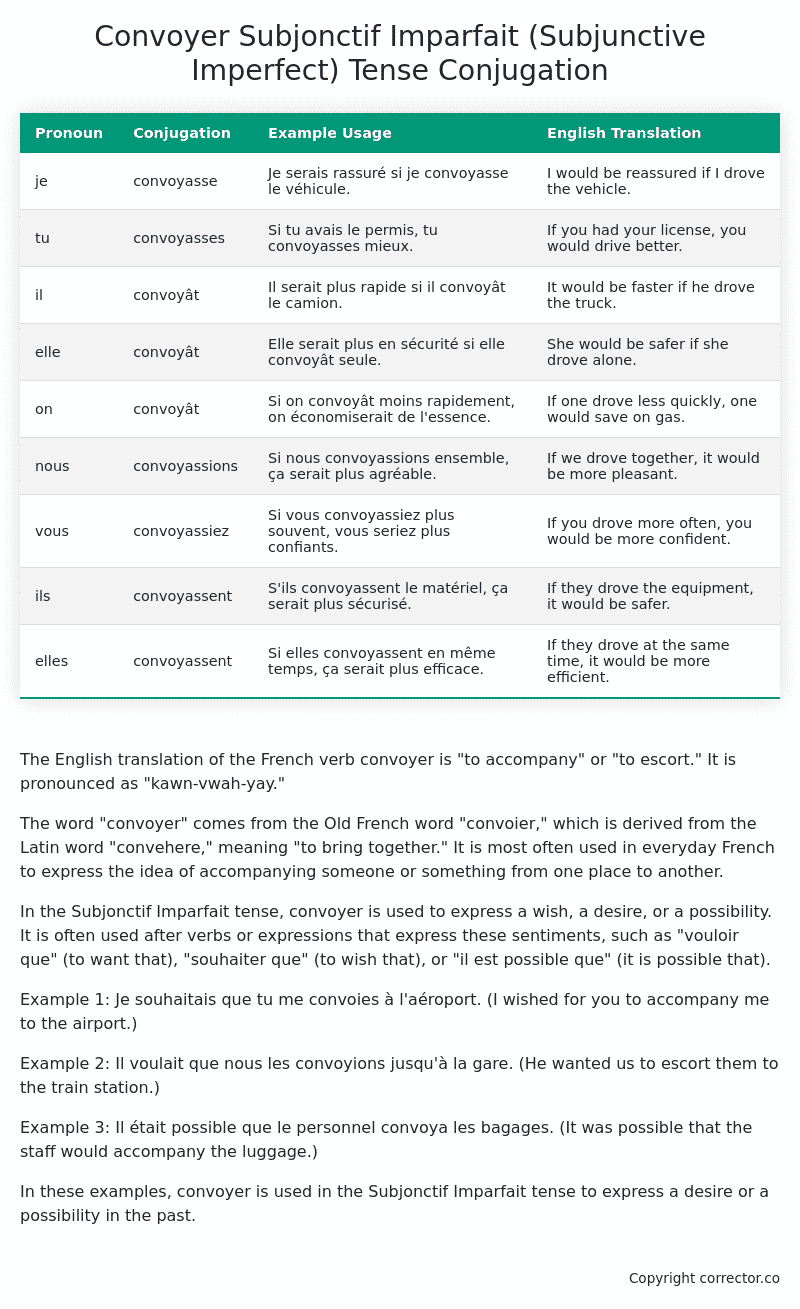Subjonctif Imparfait (Subjunctive Imperfect) Tense Conjugation of the French Verb convoyer
Introduction to the verb convoyer
The English translation of the French verb convoyer is “to accompany” or “to escort.” It is pronounced as “kawn-vwah-yay.”
The word “convoyer” comes from the Old French word “convoier,” which is derived from the Latin word “convehere,” meaning “to bring together.” It is most often used in everyday French to express the idea of accompanying someone or something from one place to another.
In the Subjonctif Imparfait tense, convoyer is used to express a wish, a desire, or a possibility. It is often used after verbs or expressions that express these sentiments, such as “vouloir que” (to want that), “souhaiter que” (to wish that), or “il est possible que” (it is possible that).
Example 1:
Je souhaitais que tu me convoies à l’aéroport.
(I wished for you to accompany me to the airport.)
Example 2:
Il voulait que nous les convoyions jusqu’à la gare.
(He wanted us to escort them to the train station.)
Example 3:
Il était possible que le personnel convoya les bagages.
(It was possible that the staff would accompany the luggage.)
In these examples, convoyer is used in the Subjonctif Imparfait tense to express a desire or a possibility in the past.
Table of the Subjonctif Imparfait (Subjunctive Imperfect) Tense Conjugation of convoyer
| Pronoun | Conjugation | Example Usage | English Translation |
|---|---|---|---|
| je | convoyasse | Je serais rassuré si je convoyasse le véhicule. | I would be reassured if I drove the vehicle. |
| tu | convoyasses | Si tu avais le permis, tu convoyasses mieux. | If you had your license, you would drive better. |
| il | convoyât | Il serait plus rapide si il convoyât le camion. | It would be faster if he drove the truck. |
| elle | convoyât | Elle serait plus en sécurité si elle convoyât seule. | She would be safer if she drove alone. |
| on | convoyât | Si on convoyât moins rapidement, on économiserait de l’essence. | If one drove less quickly, one would save on gas. |
| nous | convoyassions | Si nous convoyassions ensemble, ça serait plus agréable. | If we drove together, it would be more pleasant. |
| vous | convoyassiez | Si vous convoyassiez plus souvent, vous seriez plus confiants. | If you drove more often, you would be more confident. |
| ils | convoyassent | S’ils convoyassent le matériel, ça serait plus sécurisé. | If they drove the equipment, it would be safer. |
| elles | convoyassent | Si elles convoyassent en même temps, ça serait plus efficace. | If they drove at the same time, it would be more efficient. |
Other Conjugations for Convoyer.
Le Present (Present Tense) Conjugation of the French Verb convoyer
Imparfait (Imperfect) Tense Conjugation of the French Verb convoyer
Passé Simple (Simple Past) Tense Conjugation of the French Verb convoyer
Passé Composé (Present Perfect) Tense Conjugation of the French Verb convoyer
Futur Simple (Simple Future) Tense Conjugation of the French Verb convoyer
Futur Proche (Near Future) Tense Conjugation of the French Verb convoyer
Plus-que-parfait (Pluperfect) Tense Conjugation of the French Verb convoyer
Passé Antérieur (Past Anterior) Tense Conjugation of the French Verb convoyer
Futur Antérieur (Future Anterior) Tense Conjugation of the French Verb convoyer
Subjonctif Présent (Subjunctive Present) Tense Conjugation of the French Verb convoyer
Subjonctif Passé (Subjunctive Past) Tense Conjugation of the French Verb convoyer
Subjonctif Imparfait (Subjunctive Imperfect) Tense Conjugation of the French Verb convoyer (this article)
Subjonctif Plus-que-parfait (Subjunctive Pluperfect) Tense Conjugation of the French Verb convoyer
Conditionnel Présent (Conditional Present) Tense Conjugation of the French Verb convoyer
Conditionnel Passé (Conditional Past) Tense Conjugation of the French Verb convoyer
L’impératif Présent (Imperative Present) Tense Conjugation of the French Verb convoyer
L’infinitif Présent (Infinitive Present) Tense Conjugation of the French Verb convoyer
Struggling with French verbs or the language in general? Why not use our free French Grammar Checker – no registration required!
Get a FREE Download Study Sheet of this Conjugation 🔥
Simply right click the image below, click “save image” and get your free reference for the convoyer Subjonctif Imparfait tense conjugation!

Convoyer – About the French Subjonctif Imparfait (Subjunctive Imperfect) Tense
Formation
Common Everyday Usage Patterns
Interactions with Other Tenses
Subjonctif Présent
Indicatif Passé Composé
Conditional
Conditional Perfect
Summary
I hope you enjoyed this article on the verb convoyer. Still in a learning mood? Check out another TOTALLY random French verb conjugation!


